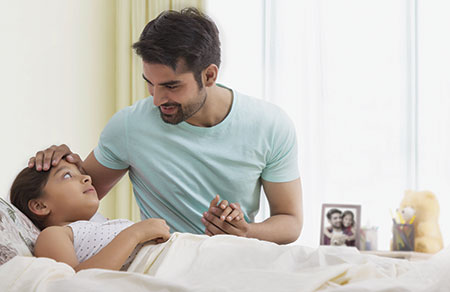It’s important for parents to have the elementary skills and knowledge required to deal with common medical emergencies and injuries, and provide first aid to children

Most parents will vouch that child health emergencies strike when least expected — when you are home alone or in the middle of the night, when doctors, neighbours or relatives can’t be summoned for help. Therefore it’s important for parents to possess elementary skills and knowledge required to deal with common medical emergencies and injuries, and provide immediate first aid to children.
Here are 10 common medical emergencies that parents need to be prepared to cope with.
Fever
This is a common childhood affliction, which if ignored could have dangerous consequences such as seizures and brain damage. Here’s what you need to do to bring down the temperature before rushing to a doctor.
• First, record the temperature with a thermometer
• If it’s above 100° F, strip the child. Don’t cover her up with a blanket to sweat the fever.
• Place the child under a fan and sponge her body with tepid tap water. As the water evaporates, the temperature will automatically drop.
• You can simultaneously administer paracetamol in the dose of 10-15 mg/k body weight. The dose can be safely repeated every four hours.
Nose bleeds
Nose bleeds (aka epistaxis) occur unexpectedly because of nose-picking dried nasal secretions. They are usually not serious. Apply ice cubes wrapped in a plastic bag to the nose and if nasal drops are available at home, apply a drop to the affected nostril and make the child sit up, leaning forward. Nosebleeds usually stop within ten minutes.
Earache
It’s not uncommon for young children to wake up in the middle of the night, screaming with ear pain. Most often, it is due to blockage of the eustachian tube connecting nose to ear. Nasal drops which open up the blocked nose can be used, together with analgesic anaesthetic ear drops. Paracetamol 10-15mg/kg/dose and an antihistamine such as diphenhydramine or levocetirizine will also temporarily relieve the pain.
Allergy
Allergies may manifest due to worm infestation, insect bites, and/or contact with allergens in food. An itchy red skin rash can be treated with antihistamines such as diphenhydramine, chlorphenhydramine or levocetirizine and/or any soothing lotion. If there is swelling, especially around the face and lips, it is a medical emergency. After administering the antihistamine, you should take the child to the nearest hospital as soon as possible.
Stomach ache
This is one of the commonest and most perplexing complaints in infants and children. It can be an isolated complaint or accompanied by fever, vomiting, diarrhoea, rashes, bloating, urinary infection, or a groin swelling. Children are usually unable to localise the pain and indicate the umbilical area. It is often a difficult ailment for even paediatricians to evaluate. Visiting a doctor or hospital is the best option if the pain lasts for more than an hour.
Sprains, strains and fractures
It’s normal for children to fall while playing or even while walking. This can result in sprains, strains or broken bones. All such injuries are potentially serious, especially if the child is unable to move the injured body part. Consulting a doctor is the best option.
Insect and animal bites
Bug bites and stings can cause great discomfort to children. A bee may leave its sting behind. A wasp does not but can sting more than once. If the insect is visible, it needs to be gently scraped off. Spider bites are not painful, and the child may not even notice a bite. However it can cause swelling, discolouration, blisters, chills, fever, rash, pain and nausea and in rare cases more serious symptoms such as seizures or coma.
• All insect bites should be washed with soap and water. Then an ice pack needs to be applied over the affected area and an antihistamine and paracetamol (10-15mg/kg/dose) administered.
• Scorpion and snake bites can be fatal and children should be rushed to hospital immediately.
• Animal bites are potentially more dangerous, whether it is a scratch or deep puncture wound. Dogs, cats, monkeys and other animals can spread fatal rabies, through their bites. I advise thorough cleaning of the wound with soap and water, and application of an antiseptic ointment before consulting a doctor for tetanus or rabies prophylaxsis and antibiotic administration, if required.
Burns and scalds
Children are naturally curious and often suffer burns and scalding from hot liquids. If your child has suffered a burn, remove any restrictive clothing immediately and run cold water over the injured area. Apply a cool compress (water from the fridge). Don’t use ice as it might damage the skin further. Also avoid applying butter, grease, coconut oil, powder, or any other remedies to the burn, as these can increase the risk of infection. Instead apply aloe vera or cream and administer paracetamol 10-15mg/kg/dose for the pain.
Foreign bodies
Children tend to put things such as pebbles, beads, food, eraser tips, or toy parts in their nose, ears, mouth and other orifices. If you notice a foreign body, it is best to contact a physician immediately.
First aid kit
Every house should have a first aid box and contain the following essentials:
• Thermometer
• Pair of scissors
• Scribbling pad and pen
• Torch (that works)
• Copies of medical insurance or hospital cards
• A gauze bandage roll
• Roll of cotton
• Few band aids
• Pain relieving ointment
• Antiseptic ointment like povidone-iodine,
• Antibiotic ointment (bacitracin, polymixcin),
• Eye drops, nose drops and analgesic anaesthetic ear drops.
• Medications that can be stored as tablets or syrups — paracetemol, anti-histamines like chlorpheniramine maleate (Avil) and diphendydramine (Benedryl), or levocetrizine
(Dr. Gita Mathai is a Vellore-based paediatrician and author of Staying Healthy in Modern India)
























